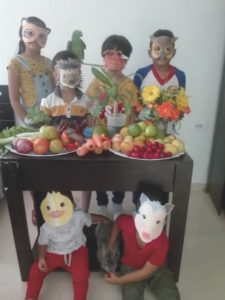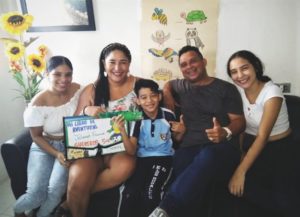
La Aldea Gazette reached out to the Monsignor Jaime Prieto Amaya Educational Institution in Cúcuta to interview Professor Edwar Mendoza and learn more about how he managed to connect with his students during confinement.
La Gazette: In what ways has home schooling, in times of a pandemic, impacted you as an educational community?
Edwar Mendoza: It was something unexpected and it forced us to make changes in many aspects of our lives. Everything we did was reduced to a very small space which was where one accommodated his study or his classroom. At first, of course, it was the unknown, but it was necessary to adapt and, well, we know that who adapts best survives. Then we were able to find ways to share activities and actions that have been useful to everyone.
LG: How has your communication been with your students during these months? We know that you have worked with them through the strategy of the golden minute, could you tell us a little about this?
EM: We talk about the golden minute when we have meaningful contact with the student. At first, communication was undeniably challenging because we had to first create a WhatsApp group to communicate; then the challenge was to energize a group where there were more than 50 parents; from there we were identifying who didn’t have access to WhatsApp, to call them by phone, and who had internet connection, to make a video call with them. There the question was: How do you keep everyone entertained at the same time? And when I managed to speak with the students and make a connection, they would say: “Hi teacher! How’s it going? Look, I promise I’ll send you the work … “, and I would interrupt and say “No, no, no …! Instead, tell me: How are you? How do you feel? What have you managed to do in quarantine?” That’s the golden minute!
LG: What strategies did you use to connect with your students?
EM: I started in a very creative and playful way, interacting with them and involving myself in the activities that the book of La Aldea put forward, which was very useful during this virtual phase because I proposed the challenges and my students were very attentive, listening to the story. I put the stories to them, I sent them the audio, then I sent them images of the activities and they were very happy, also because I was involved in the activities with them, then they would do my exercises and send them to me. La Aldea has changed my life, my way of teaching and the way in which I reach my students.
LG: Do you think it was important to develop the socio-emotional aspect in your students during the health emergency?
EM: Sure! It’s supremely important, we must not only look at how a student is preparing for a test, how much knowledge they have, but also how they’re relating to their family, how they are relating to their environment, how do they feel at home … Are they listening to each other at home? Are they having an assertive dialogue?


